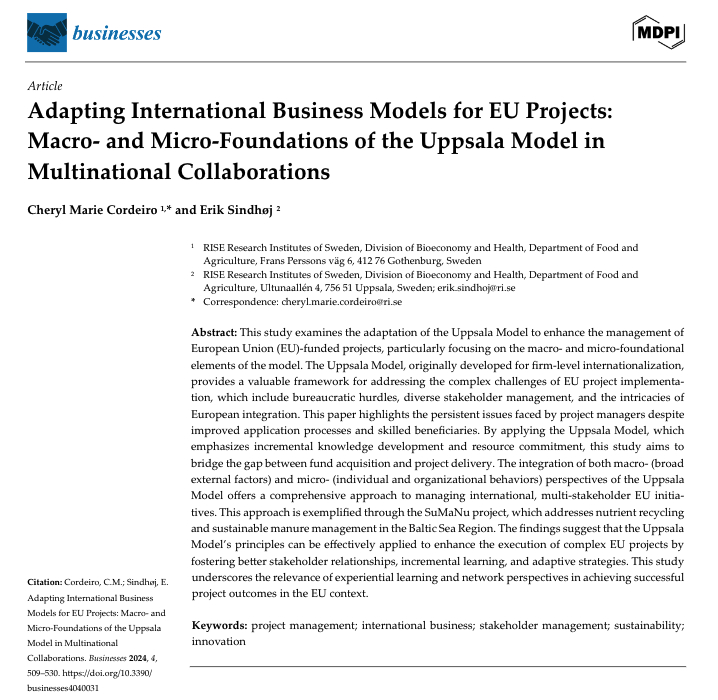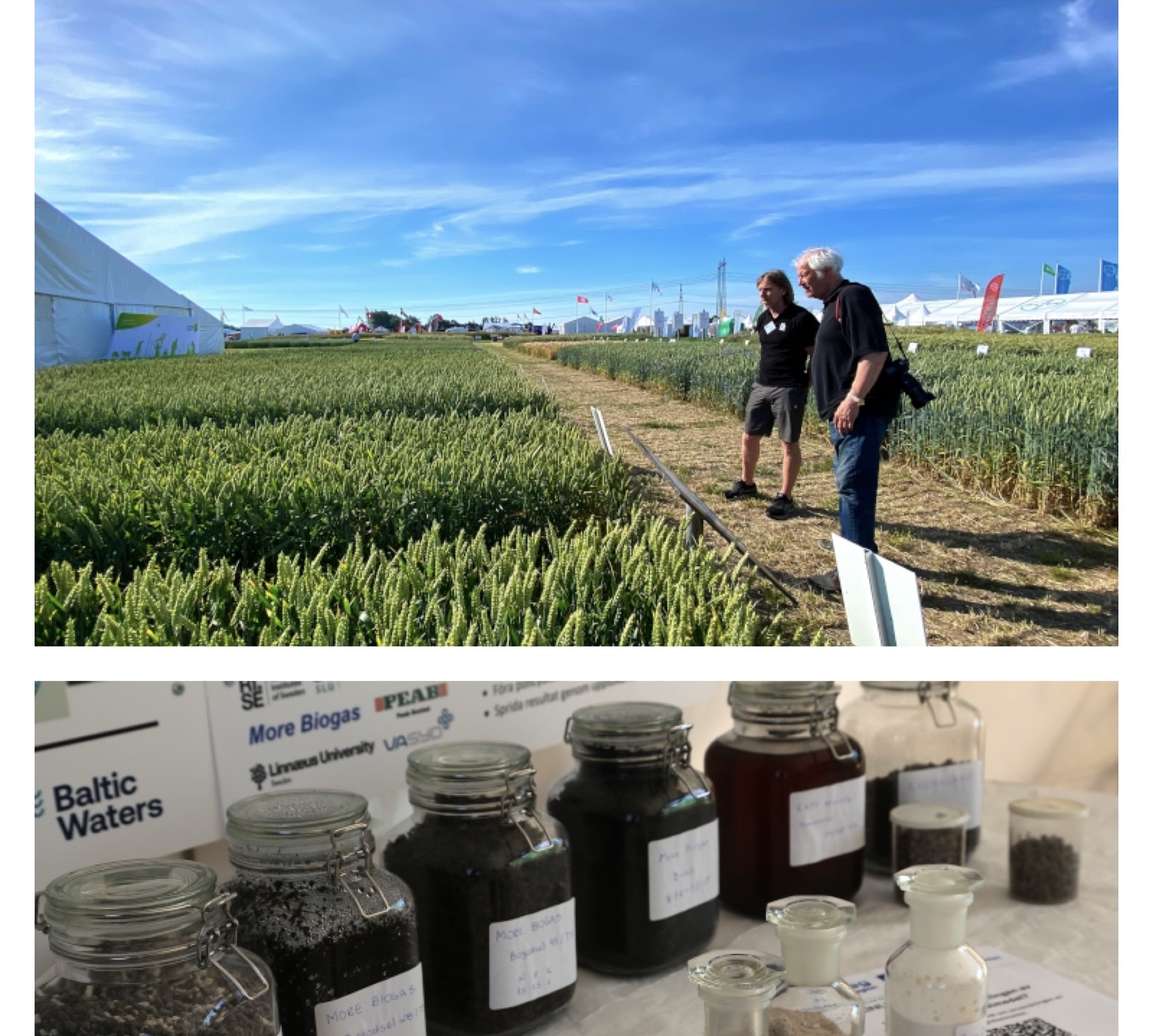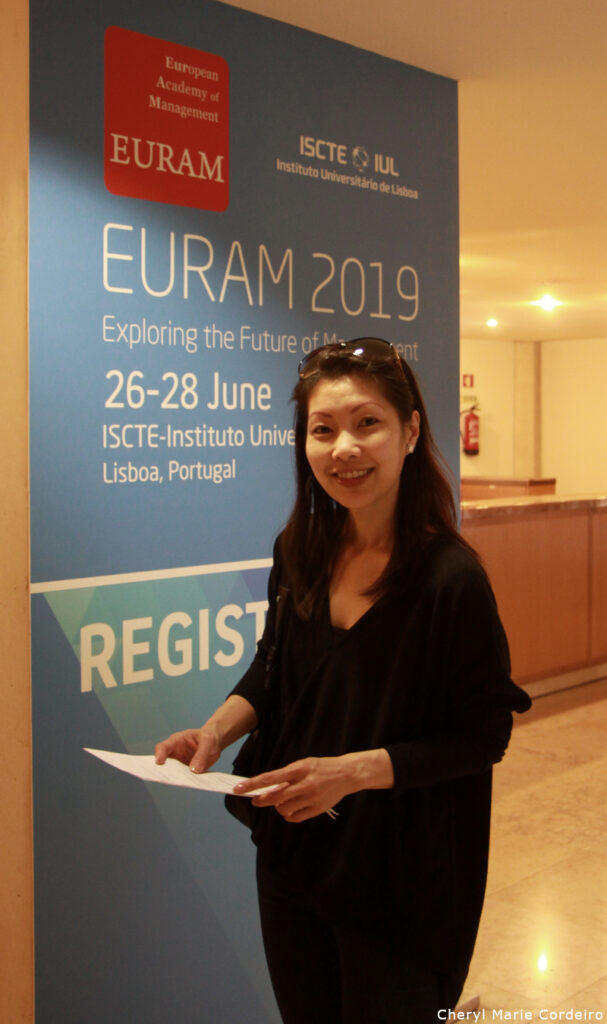
Reference
Cordeiro, C.M.; Sindhøj, E. Adapting International Business Models for EU Projects: Macro- and Micro-Foundations of the Uppsala Model in Multinational Collaborations. Businesses 2024, 4, 509-530. https://doi.org/10.3390/businesses4040031

Reference
Cordeiro, C.M.; Sindhøj, E. Adapting International Business Models for EU Projects: Macro- and Micro-Foundations of the Uppsala Model in Multinational Collaborations. Businesses 2024, 4, 509-530. https://doi.org/10.3390/businesses4040031

Photo © JE Nilsson 2024
The growing discourse on recycled nutrients (RNs) in organic farming is influenced by several key factors. Nutrient deficits, particularly of phosphorus (P) and potassium (K), are a significant challenge in organic farming, as biological nitrogen (N) fixation can only partly meet nitrogen demand, necessitating the replenishment of other nutrients through external inputs. Yet the uptake and use of RNs remains challenging. Concerns about contaminants, such as potentially toxic elements (PTEs), microplastics, and antibiotic resistance genes, create doubts among organic farmers regarding the safety and health impacts on soil and crops. Although some contaminants are declining, and soils show resilience in degrading or stabilizing pollutants, uncertainties persist.
The integration of nutrient recycling within the broader circular economy framework aligns with organic farming principles, promoting the reuse of societal waste streams to reduce reliance on finite mineral resources and minimize environmental impacts. However, acceptance of such practices remains debated within the organic sector. Economic feasibility and policy support are crucial, as cost-benefit analyses highlight the varying viability of different ecotechnologies. Technologies like anaerobic digestion of agricultural wastes are more economically viable compared to those in the wastewater sector, which require significant investments. Effective implementation depends on aligning economic and policy incentives with sustainability goals.
Public perception and stakeholder involvement also play a critical role, as participatory decision-making processes address local concerns and improve the legitimacy of implementing new ecotechnologies. Addressing stakeholders’ concerns about health risks, environmental pollution, and technical reliability is essential for broader acceptance. These factors collectively shape the ongoing discussion on the use of RNs in organic farming, balancing the benefits of nutrient recycling with the challenges posed by contamination, economic viability, and public acceptance.
In this article, a brief literature review is conducted to place the current discourse and concerns regarding RNs and nutrient recycling practices within the broader context of the circular economy, aiming to investigate how the uptake of RNs can be more effectively addressed.
Using 9 journal articles [1-9] as example studies of the field, this article begins by tracing the historical context and use of term “recycled nutrients”. It examines the various technological, environmental, economic, and policy-related dimensions of nutrient recycling, and illustrates how the practice of nutrient recycling can become an integral part of the circular economy. Continue reading ”Advancing the Discourse on Recycled Nutrients: Integrating Sustainable Practices into the Circular Economy” →
Image credit: Gencraft
Strategic Action Fields (SAFs) [1] are meso-level social orders where various actors—established players, challengers, and sometimes governance units—interact, compete, and collaborate. These fields are characterized by ongoing power struggles, negotiations, and cooperation, leading to the creation of new norms, practices, and institutional arrangements. In the context of societal and technological changes, SAFs can provide a framework for understanding how different sectors converge and evolve through the actions of socially skilled actors who navigate and shape these complex interactions.
In the face of global climate challenges, the transformation of energy systems has become imperative. In the example of Germany, the country’s innovative approach to this transformation is setting a benchmark by bringing together energy, mobility, and Information Technology. In a 2017 [2] study, scientists explore how living labs are evolving into strategic action fields, fostering intersectoral collaboration and innovation. Continue reading ”Redefining Energy Innovation: How Strategic Action Fields (SAFs) are Transforming the Energy Landscape” →
Figure 1. A VOSviewer bibliometric visualization for the keywords, ”nexus”, ”transformative” and ”tools”.
The word and concept of most interest for me this year is nexus, defined broadly as a connected group or series. When placed in the context of natural resources management, a nexus framework renders a system of systems perspective. But which fields of knowledge are reflected in research and current business practices in natural resources management, and how are these various fields of study and business sectors interconnected?
Continue reading ”The Nexus approach to natural resources management” →
Chapter 2 Emerging management concepts in an era of global transitions:Co-management of natural resources and the Swedish management style.
Reference Cordeiro, C. M. (2021). Emerging management concepts in an era of global transitions: Co-management of natural resources and the Swedish management style. In Saruchera, F. (Ed.), Advanced Perspectives on Global Industry Transitions and Business Opportunities (pp. 21-39). IGI Global. http://doi:10.4018/978-1-7998-4303-0.ch002
Abstract In a period of global transition, this chapter discusses emerging management practices in the context of natural resources management in international business. In the past decades, the co-management concept and practice have been of increasing interest to scholars in ecology management and marine environment management. In the late 1980s, the Swedish management style began to be explicitly de-bated with scholarly interest, particularly in the services industry after observing successful business practices. The literature on the co-management of natural resources and the Swedish management style in multinational enterprises point promisingly towards parallel management strategies applied in dis-tinctly different working environments and contexts. Based on empirical data, this chapter’s objective is to highlight and distill from natural resources co-management and the Swedish management style a shared management best-practice approach in working contexts that have multiple actors and stakehold-ers who hold multicentric agendas.
Chapter 9 Culture from a value systems perspective: A study of CATCH, an interdisciplinary research project in fisheries and aquaculture in Norway
Reference Cordeiro, C.M. & Sogn-Grundvåg, G. (2020). Culture from a value systems perspective: A study of CATCH, an interdisciplinary research project in fisheries and aquaculture in Norway. In R. Brunet-Thornton (ed), Examining Cultural Perspectives in a Globalized World. Hershey, PA: IGI Global. doi: 10.4018/978-1-7998-0214-3
Abstract International interdisciplinary projects (IDR) are a microcosm of multicultural landscapes. Through a culture theories perspective, in particular, viewing culture as a system of explicitly and implicitly coded values, this chapter conveys the processes and results of a study that investigates and uncovers the management strategies of an IDR project, CATCH. The study of culture from a value systems approach enables a more subtle and nuanced approach to the analysis and framing of cultural heterogeneity in the context of an IDR project, beyond the often dichotomous, cultural dimensions construct. Due to the multiple actors in an IDR project, the example of CATCH illustrates too, a more nuanced view of cultural filters that arise from each academic discipline. Using the culture as value systems perspective, this chapter shows how multicultural landscapes and different resulting knowledges can be leveraged towards an integrated worldview when solving challenges in a globalized world with limited resources.
Continue reading ”Book chapter publications, edited series” →
Crab from the Swedish west coast, Sweden.
Text & Photo © Pixabay Ylvers-337353, JE Nilsson & CM Cordeiro 2019
As I began reading more literature on marine and fisheries management, I observed how management concepts in the field of natural resources management were framed differently than those found in international business (IB) studies.
Most IB management theories focused on the efficiency of the processes of the manufacturing sector and firm internationalization strategies [1, 2], whereas natural resources management had the ecological dimension factored into their management models and strategies even if their processes included global manufacturing [3, 4]. I would today reason that IB studies also encompasses an ecological dimension, but they are framed predominantly from the perspective of human resources management or organizational culture and behaviour.

Paper presentation at EURAM 2019, SIG12 Research Methods and Research Practice at ISCTE – Lisbon University Institute, Lisbon, Portugal.
Text & Photo © JE Nilsson & CM Cordeiro 2019
The annual conference for the European Academy of Management, EURAM 2019, took place between 26 to 28 June in the beautiful historic city of Lisbon in Portugal. EURAM was founded in 2001 and today has members from more than 49 countries around the globe. This year’s theme, ”Exploring the future of management” [EURAM 2019 Conference Program PDF] saw a high degree of involvement with more than 1700 paper submissions on a variety of management themes that were organized in 14 Special Interest Groups (SIGs).
Continue reading ”26-28 Jun. EURAM 2019 Conference, Lisbon, Portugal” →
Headed for the international trading pavilions for wine, at the 100th China Food & Drinks Fair (CFDF) spring fair 2019, Chengdu, China.
Text & Photo © CM Cordeiro 2019
One of the oldest and largest international food fair, the China Food and Drinks Fair (CFDF) saw its 100th anniversary this year held in Chengdu, China. The exhibition was held in two parts. The first event, the Táo IWSS (International Wine & Spirits Show) took place from 17 to 20 March 2019. This event had decentralized locations, held at the hotels Shangri-La and Kempinski in Chengdu. In 2018, this 4 day trade-only show exclusive for wine, spirits and beers sector had 15 pavilions showcasing both renowned and emerging international wine-producing countries and regions that included China. 32 innovation events with industry keynote speakers were held with specific themes. A total of 80 000 traders gathered in this 4 day event in 2018, with the Shangri-La hotel in Chengdu housing more than 600 exhibitors and the Kempinski hotel housing more than 500 exhibitors. The second event, the 100th CFDF took place from 21 to 23 March 2019 at the Chengdu Western China International Expo City.
At the food and food technology halls 1-3 at the 100th China Food & Drinks Fair (CFDF) spring fair 2019, Chengdu, China.
Text & Photo © M Svorken, CM Cordeiro 2019
With a population that is 18.41% of total world population, China ranks top of the list of countries and dependencies by population [1]. Standing on the exhibition grounds, in the midst of the CFDF 100th spring fair in Chengdu, you certainly feel as stardust, that make part of the constellation of individuals moving through just this one fair. The vast spaces and large numbers of individuals walking by, easily masks one of the country’s upcoming significant challenges, which is a decline in birth rate and an increase in life expectancy [2]. As such, the upcoming domestic issues for the country is one that needs multiple levels and time-frames of strategic policy planning that includes food, agriculture and technology.
At the Táo IWSS (International Wine & Spirits Show), 17-20 March, Shangri-La, Chengdu, China 2019
Text & Photo © CM Cordeiro 2019
The 2019 Táo IWSS (International Wine & Spirits Show) took place from 17-20 March in Chengdu, China. It was a 4-day trade-only event of the 100th CFDF (China Food and Drinks Fair), where exhibitors move from showcasing at hotels to the Chengdu Western China International Expo City from 21-23 March. In 2018, Táo IWSS had 15 pavilions between the Kempinski hotel and the Shangri-La hotel housing exhibitors from both renowned and emerging wine-producing countries and regions, including China. Record trade visitors were documented in 2018 with over 550 international and domestic exhibitors at the Kempinski hotel, and over 600 exhibitors in Shangri-La hotel. There were over 80,000 trade buyers from China alone to the Táo IWSS in 2018.